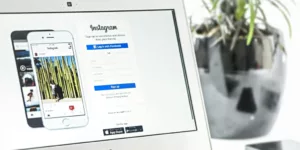Have you ever considered using private proxies to connect your Instagram account?
If you are a regular Insta user, you most probably didn’t consider or you didn’t even know that Instagram proxies exist. But, if you are a marketing or social media manager, chances are that you heard of them and even considered implementing them in your setup.
However, they are not a necessary tool and in most use cases, you won’t need them at all. In these cases, you are better off connecting straight to the social network without giving much thought to what IP address your account uses.
With the rise of social media marketing and its promise for greater returns, marketing managers consider using Instagram more than ever. The trendy social network became a great channel for marketing and promotions.
According to SmartInsights, 59% of Instagram users are 18 to 29 year old. So, to increase their products’ exposure to a young and dynamic audience, some marketing managers recurred in buying private proxies for Instagram to manage multiple accounts.
This is the most liked Instagram photo to date.

Using proxies to connect social accounts is not a straightforward task and if you plan on doing it, you need to consider certain aspects. For this, we sat down with Chris Roark from BestProxyProviders.com, a leading proxy review platform, to discuss Instagram proxies misconceptions and issues and how to overcome them. Also the most important question: “When NOT to buy them?”
Here’s what we cover in this article:
- What are private proxies for Instagram
- Who’s their main user and why?
- 1. If I use Instagram proxy IPs, does it mean I do black-hat marketing?
- 2. Do I need multiple IP addresses everytime I connect several accounts?
- 3. Do I need a proxy for my personal account?
- 4. What apps can I use to manage multiple accounts through different IPs?
- 5. Should I buy dedicated Instagram proxy IPs or rotating ones?
First, before jumping to the 5 misconceptions, let’s have some backdrop info on understanding the overall context.
What are private proxies for Instagram?
The simple and straightforward answer is that Instagram proxies are virgin, dedicated IP addresses allocated by a provider for login accounts on Instagram.
Let me expand this answer a bit to get a better understanding of the current state of the industry.
First, proxies are custom-built servers that mask their user’s real IP address, location and connection by forwarding their [users] Internet connection through the proxy server. In this way, all accessed websites will see only the server’s IP address and think that the user is located where the IP address indicates.

As HowToGeek mentioned, proxies were developed to make users anonymous.
Thus, when connecting social media accounts through proxy servers, the social networks will see only the server’s IP address, but not the real IP address and the location from where these accounts are connected.
This feature brings a few benefits when connecting social accounts:
- Enhanced privacy – The social network doesn’t know your real location and can’t track you
- Account protection – By using the same IP address to connect, you protect your account from potential bans – especially when travelling and connecting from abroad
- Multi-account management – You can manage multiple accounts from the same device and isolate them by connecting each one through its own proxy IP. The social network won’t know that you manage multiple accounts and can’t group and ban them.
Here’s a YouTube video on what proxy servers do
So, to answer the question of what are these proxies, I can say that Instagram proxy IPs are dedicated IP addresses that account owners and social media users buy to protect their accounts when connecting from multiple places or when managing multiple accounts from the same place.
Consider proxies for social media as a tool to isolate an account from the connection setup it uses to connect, with the purpose of protecting the account from potential bans and blocks.
From the above list of three benefits, the latter one is the one of our focus because the largest group of buyers of Instagram proxies are marketers and social media managers. And among this group are the most common misconceptions.
On the other hand, providers started offering Instagram proxy packages as a guaranteed way of connecting to Instagram through clean, virgin IPs. You see, most packages are composed of clean IPs, which have never been allocated before for social media, so when somebody uses them, he knows that nobody used them before and there is no risk of account ban or block.
Who’s the main user and why?
As mentioned above, marketing and social media managers are the most common group of Instagram proxy packages buyers.
They are the largest buying segment because of a real need. You see, marketers manage several accounts on behalf of their clients. And they need a way to protect and isolate each individual account from other clients’ accounts.
This is why the most common and guaranteed-to-work way of isolating each individual account is to use a different IP address to connect it to the social network.
In this way, the marketer get a couple of benefits:
- Instagram doesn’t know that the marketer manages different accounts from the same connection
- The social network can’t draw a distinct connection between these accounts because it can’t identify them as connecting from the IP (remember, each account uses a different proxy IP address)
In this way, the marketer protects his client’s accounts and avoid having his accounts blocked because IG won’t be able to group them [the accounts] based on their IP address to flagged them as suspicious.
This is the main reason why marketers buy proxy IPs for Instagram and for other social network.
Furthermore, let’s see what are the top five misconceptions and how to overcome.
1. If I use Instagram proxy IPs, does it mean I do black-hat marketing?
This misconception is so common and many marketers believe it that they ignore buying proxies and start managing client accounts through a single IP address. Risking blocking or banning their clients’ social media accounts.
The simple truth is that using Instagram proxy doesn’t mean you do black-hat marketing, but the way you use them can.

For example, if you use your IPs to connect several accounts to Instagram with the intent of protecting and isolating your accounts, you don’t do any black-hat at all. In fact, you just create your own “insurance policy” for your clients’.
In this way, using proxies should be considered a sound business practice.
However, if you use your proxies to automate and spam Instagram with hundreds or thousands of accounts with content copied from other accounts, you can consider yourself a black-hat marketer.
It’s not the tool, but how you use it is the differentiating factor between white-hat and black-hat.
2. Do I need multiple IP addresses everytime I connect several accounts?
Yes and no. If you are connecting your own or your family’s accounts through the same connection, then you shouldn’t worry. You don’t need to buy or use anything else.
However, once you consider managing and connecting social media accounts on behalf of others (potential clients), then you should consider using proxies.
Another way of looking at it is to consider if you need to isolate these Instagram accounts. For example, you don’t need to isolate your account from your sibling’s account.
However, if you manage accounts from, let’s say, client A and client B, from two different business areas, you need to isolate them.
Because if, by mistake your client’s A account is blocked, by association (based on the IP address used to log in), your other client’s [B] account risks a block as well.
Hence, instead of using proxies and isolating client’s A already blocked account, the issue could spread to client’s B account.
On some forums, there are people mentioning that they connect up to three accounts per IP. But best-practices recommend using only one account per IP. Because you need to isolate each individual account.
I think you can see how this can become a real issue for marketers managing accounts on behalf of tens of clients.
3. Do I need a proxy for my personal account?
Again the answer here is yes and no. First, let me start with the no.
No. You don’t need it if you connect – like most users – by using your smartphone and always from the same city or area.
Yes, you need a proxy if you travel a lot and connect your account from local WiFi networks. You need it to avoid any blocks. Because by using a proxy, the social network will only see the server’s IP address every time you connect. It won’t know if you connected from Miami, Rio or London. So it can’t suspect your account and block it.
4. What apps can I use to manage multiple accounts through different IPs?
There are several social media management tools or apps that you can use. Some of them support multiple accounts login while others do not.
And from those supporting multi-login, some support proxy connections. By which, Jarvee and FollowLiker are the most popular and commonly used by marketers and social managers.

5. Should I buy dedicated Instagram proxy IPs or rotating ones?
You should buy fixed dedicated IPs.
They are also known as datacenter proxy servers. And you need them for the same reason as in the example from point 2: you need a dedicated Instagram proxy IP to isolate your account and tie its connection to the same IP address.
On the other hand, rotating or residential proxies do not have fixed IPs and the IP your proxy uses, changes every five or ten minutes, so you can’t really tie your account to an individual IP.
Hence, by using rotating IP, you face the same risk as when connecting multiple accounts without proxies.
In the end… are Instagram proxy packages a must?
The bottom line is that proxies for Instagram and other social networks are not a must for more than 99% of users. In which case, you can simply access Instagram from your smartphone without any issues.
It all depends on your setup and how you plan on using your accounts. In which case, you should consider buying them, especially if you manage social media accounts of others.








